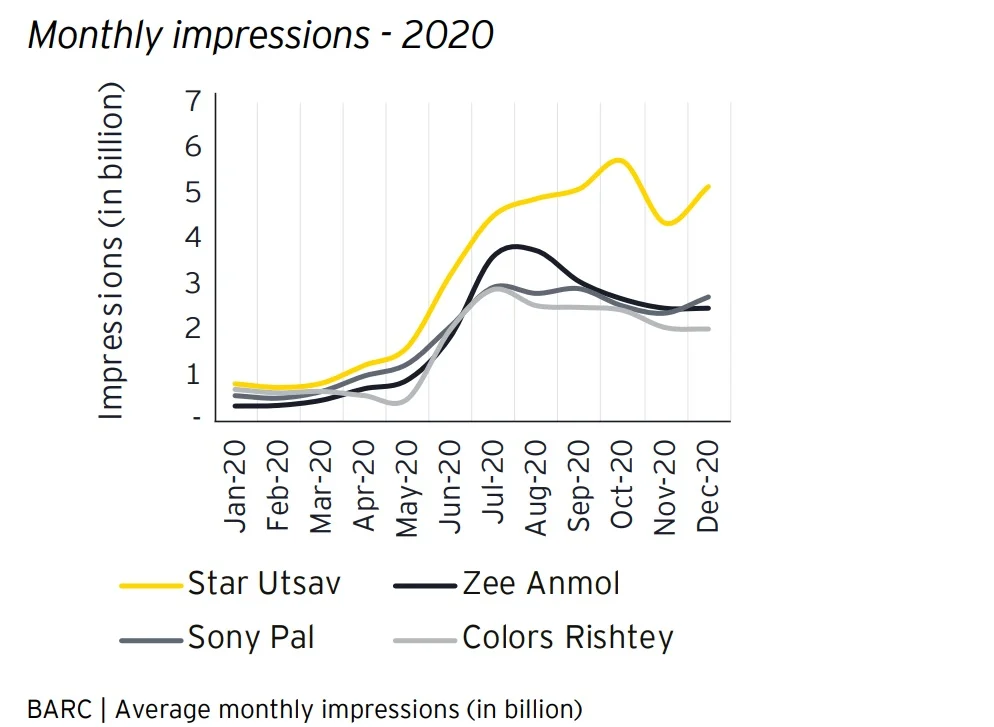Headlines Of The Day
Big networks regain leadership in the FTA space; new GECs struggle to keep pace
Star Ustav, Zee Anmol, Sony Pal, and Colors Rishtey are the four most-watched channels in the Free To Air space. A year back, Dangal, B4U, and the likes would rule the chart. What changed? In June 2020, the “Big Daddies” of Indian broadcast business, Star and Disney India, ZEE, Sony, and Viacom18 decided to return to FTA space that they had left in February 2019.
The Telecom Regulatory Authority of India (TRAI) mandated the New Tariff Order where customers would subscribe to the channels they want to watch, instead of Cable operators “forcing” everything they had. This forced the “Big Daddies” to create bouquets, and in a price-sensitive market like India, the quantity is always critical. The broadcasters added all FTA channels in the respective bouquet to enhance the weight. Also, TRAI made it clear that the Pay channels and free ones cannot be clubbed in the same bouquet.
Enterr10 network’s general entertainment channel, Dangal latched on the opportunity and became the market leader. B4U become another major player with its music and movie channels, Shemaroo which despite being a major media company stayed away from mainstream TV, launched its free to air channel Shemaroo TV with eyes on advertising money spent on the Free To Air space.
As Star, Zee, Sony, Viacom18 left the space, according to EY, they took away around Rs 1,000 crore of advertising money. Yet, around Rs 1,500 – 2,000 crore was being spent on FTA with GECs commanding a lion’s share. Most of the content on these FTAs were reruns of shows aired by leading GECs during prime time. For Dangal, it was the NDTV Imagine shows that were working wonders.
In January 2020, TRAI recommended certain amendments to the NTO, mandating broadcasters to change a lot of things, one of which was bundling. The TRAI recommendation said, “The sum of the a-la-carte rates of the pay channels (MRP), forming part of a bouquet, shall, in no case, exceed one and half times the rate of the bouquet of which such pay channels are a part.”
TRAI added, “The a-la-carte rates of each pay channel (MRP), forming part of a bouquet, shall, in no case, exceed three times the average rate of a pay channel of the bouquet of which such pay channel is a part.” So, the channels priced at 10 paise can no longer be in a bouquet with the ones priced at Rs 19.
That brought the big four back to the FTA. They came in with GECs and movies channels and were again available on DD Freedish – a direct-to-home service for which the consumers do not need to pay monthly fee but can only access free to air channels. Manish Singhal, MD of Enterr10 Network, Hiren Gada, CEO of Shemaroo Entertainment were caught by surprise.
Gada, in an interview with afaqs! had said that he had expected the big four to return in 2021 and not in 2020. Manish Singhal was of the view that the big four will bring back the viewers that they took away and the advertisers too will return chasing the eyeballs.
Channels like Zee Anmol, Sony Pal, Star Utsav, and Colors Rishtey, which were re-launched on DD Free Dish, according to BARC India data, witnessed viewership as high as the pre-NTO period.
However, while the genre shrank by Rs 1,000 crore when they left, EY suggests, those generated Rs 400 crore of incremental advertising revenues in 2020, and in 2021, ad spend on FTA could see an increase of Rs 1000 crore.

Currently, out of the top 10 channels in Free Platform, there are Star Ustav, Zee Anmol, Sony Pal, and Colors Rishtey in the top four slots followed by Dangal in fifth. Film distributor Goldmines’ Hindi Movie Channel Dhinchak is on sixth position. Zee Anmol Cinema and Star Utsav Movies follow at the seventh and eighth slot. The Q at ninth and Zee owned Big Magic at tenth. From no presence at all a year back to seven out of the top ten channels, the ‘Goliaths’ have come heavy on ‘Davids’.
The Q is a new entrant in the top 10. It is a channel targeted primarily at the youth of the country. It is run by QYOU Media which operates in India and the United States, produces and distributes content created by social media stars and digital content creators. Simran Hoon, CEO, The Q says she is not rattled by the dominance of ‘big daddies’ in the top 10. “Their arrival has grown the space by 50% in terms of gross rating points and the average time spent per user per day which was at one hour thirty minutes before the arrival of big networks has increased by 35 per cent.”
However, if the big networks, now that they are a part of the race, stop licensing content to the FTA GECs, analysts feel they will struggle to survive. The 10-second ad rates during prime time on FTAs are sold between Rs 5,000-10,000 while pay-TV costs brands around Rs 1.5 lakh to 3 lakh depending on the show. That is why payTV channels commissions show which cost around Rs 10 to Rs 15 lakhs (fiction shows) per episode and the non-fiction or mythological ones go up two time.
Simran Hoon feels there will be a place for all and in terms of advertising money, “we are signing deals with big advertisers,” she asserts. That she believes will make it economically viable for them to spend on new content. Afaqs






You must be logged in to post a comment Login